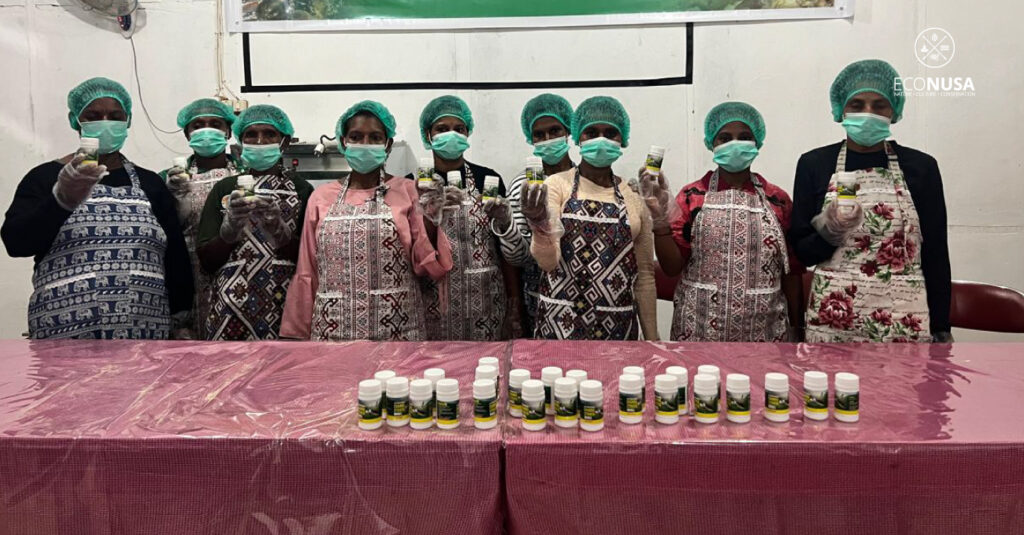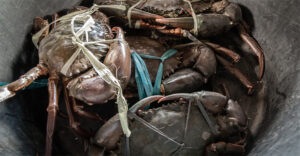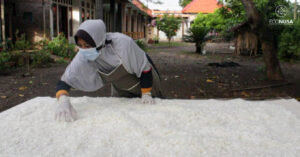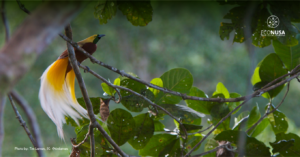
The Digoel River, flowing through Boven Digoel Regency in South Papua, is renowned for its abundant fish resources, such as tilapia and snakehead fish. The local community typically sells these fish fresh at the market. Vendors in Boven Digoel usually earn between IDR 50,000 and 150,000 daily. Besides fish, they also sell vegetables and traditional woven bags known as noken.
The plentiful fish stock in the Digoel River has led the community to hope for training in processing fish into products that could increase their income. To meet this need, EcoNusa Foundation, in collaboration with the Production Forest Management Unit (KPHP) LIII Boven Digoel, organized a training session on making snakehead fish albumin pills on June 19-20, 2024.
Read Also: Building Indigenous Community Resilience Through Taro Commodity
“The forest area in Boven Digoel covers approximately 630,000 hectares, most of which are production forests. This potential needs to be utilized and developed sustainably. One way is through processing snakehead fish into albumin pills, which are high in protein and beneficial for health,” said Viviana Maharani, Assistant for Government and People’s Welfare in the Boven Digoel Regency Government, during her opening remarks.
Benefits of Snakehead Fish
Snakehead fish (Channa striata) is a freshwater fish rich in nutrients. It contains various vitamins and minerals that benefit the body, such as supporting muscle growth and tissue formation, maintaining fluid balance, minimizing the risk of heart attacks, reducing the risk of premature birth, lowering the risk of osteoporosis, and accelerating wound healing. Due to its nutritional content, snakehead fish is often recommended for consumption by various groups, from children to the elderly and pregnant women.
The training in making snakehead fish albumin pills also plays a role in preserving the forest area. Since the Digoel River flows through the forest, the hope is that the community, once they benefit from the non-timber forest products, will be motivated to protect their forest. “So, if someone comes to buy the land or the village, they can say no, because they already have albumin pills that sustain them. If we give away this land or village, the fish might disappear due to company waste,” said Maryo Sanuddin, Head of EcoNusa Regional Papua.
Read Also: Mama Yulita Turns Shrimp Heads Waste into Economic Value Products
A total of 10 women and 8 men from the Awyu Tribe, who reside around the Digoel River, participated in the training on processing snakehead fish into albumin pills. On the first day of training, they learned how to process snakehead fish into the pill’s filling. This included cleaning, boiling, and drying the fish in an oven for 18-20 hours to reduce the water content in the fish meat. Facilitators supervised this process to ensure cleanliness and that each step met product standards.
Antonius Imbanop from the Investment and Integrated One-Stop Service Office of Boven Digoel Regency suggested that the group members could form a cooperative to produce the pills. His agency is willing to assist them in obtaining legal permits. “This legality is crucial for securing production permits from the BPOM (Food and Drug Monitoring Agency),” he said.
Capacity Building
According to Ruri Yulianti from the Merauke Food and Drug Monitoring Agency, BPOM’s role includes supervising drugs and food, as well as supporting Micro, Small, and Medium Enterprises (MSMEs). The albumin pills would be categorized as traditional or natural medicine, for which licensing can only be obtained through BPOM. “For human resources, the group must have at least one pharmacist or pharmaceutical staff member. Additionally, a business entity is required for the albumin pill permit process, with a cooperative being the minimum requirement,” she explained.
Read Also: Wasur National Park, Paradise of Migrant Birds in Eastern Indonesia
Adhe John Moisiri, Head of KPHP Boven Digoel, stated that the training in making albumin pills is one strategy for achieving community empowerment and sustainable natural resource management. The goal is to improve the economy of forest farmer groups supported by KPHP Boven Digoel.
The products will be marketed through the forestry gallery. “The next step to focus on is obtaining a distribution permit from the BPOM. This is important because without it, the product cannot be freely marketed and will remain confined to the Boven Digoel area,” he said.




